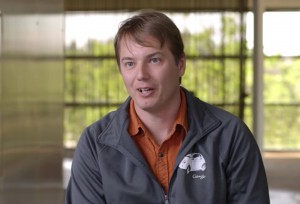
W and Hyundai are teaming with former Google autonomous vehicle guru Chris Urmson to develop self-driving technologies.
Volkswagen and Hyundai have formed a new partnership with Aurora, an autonomous vehicle start-up founded by former Google self-driving vehicle chief Chris Urmson, with a goal of getting the technology to market “quickly, safely and broadly.”
The announcement serves as something of a redemption for Urmson who left Google in 2016 without a formal plan. Ultimately, he decided he wanted to run his own show and formed Aurora Innovation in Pittsburgh, also home to Carnegie Mellon University, where Urmson was before joining Google, now Waymo.
“Our priority at Aurora is to make self-driving cars a reality quickly, broadly and safely, and we know we will get there faster by partnering with innovative automakers like the Volkswagen Group,” said Urmson, a pioneer in self-driving technology who co-founded Aurora. “This partnership establishes a deep collaboration using Aurora’s self-driving technology, and together we will bring self-driving vehicles to market at scale.”
Automakers are investing billions of dollars to bring autonomous and fully driverless vehicles to the road. The first semi-autonomous systems, such as Tesla’s Autopilot and General Motors’ Super Cruise, are always on the market. And GM has promised to begin building fully driverless vehicles for use in ride-sharing fleets by 2019. VW last year revealed a self-driving prototype dubbed Sedric it hoped to put on the road by 2021.
Waymo is already testing autonomous versions of the Chrysler Pacifica Hybrid minivan in a pilot ride-sharing program in the Phoenix area – though they will still need a backup “operator” behind the wheel to take control in an emergency – and soon plans to start testing completely driverless models.
(Google loses autonomous vehicle guru Urmson. Click Here for the story.)
But there remain plenty of skeptics who question how soon such technology will actually be available for prime time applications. They note, among other things, that the current state-of-the-art system still has severe limits. Most of the current technology still can only operate on well-marked roads, and usually only limited-access highways. Even the most advanced prototypes struggle when being used on snowy and icy roadways. Waymo also plans to begin testing its vehicles in Michigan this winter.
Despite such challenges, the push is only intensifying to bring self-driving vehicles to market. There are several reasons why. For one thing, experts, including former National Highway Traffic Safety Administration chief Mark Rosekind, believe the technology could all but eliminate crashes, injuries and the highway fatalities that claimed about 35,000 American lives last year. Self-driving vehicles are also expected to be better at squeezing more vehicles onto current highways, reducing the country’s worsening traffic congestion.
Ride-sharing services, meanwhile, believe that fully driverless vehicles will slash the cost of travel to the point where they will be able to offer their services at a cost lower than that of owning and operating a personal vehicle. A recent Boston Consulting Group study estimated more than 20% of the miles Americans travel by car in 2030 will be in driverless ride-share vehicles. Such technology also could make it easier and more affordable for the elderly and handicapped to remain mobile.
“For me, this is the reinvention of mobility and the automobile,” said Volkswagen Group Chief Digital Officer Johann Jungwirth. ““Our vision is ‘Mobility for all, at the push of a button.’ This means that we want to offer mobility for all people around the world. Mobility also for children, elderly, sick and visually impaired people, really for all.
(New study sees 21 million autonomous vehicles on the road by 2035. Click Here for the latest.)
Jungwirth said he expects that “working with Aurora … will give us a giant leap forward” in VW’s bid to bring autonomous technology to market and enter new areas of business collectively known as “mobility services.”
For his part, Hyundai Motor Co. Vice Chairman Woong Chul Yang said, “the future of transportation is autonomous,” but he added that the technology “needs to be proven in the real-world to accelerate deployment in a safe and scalable manner.”
Aurora is just one of a flood of new start-ups focusing on autonomous vehicle systems, as well as more familiar auto suppliers like Continental and Aptiv – the recently renamed Delphi. While VW and Hyundai have chosen to partner with the new company, which is jointly based in San Francisco and Pittsburgh, other automakers have decided to bring their research efforts in-house, often at substantial cost. That includes both Ford and GM. The latter maker last year spent $1 billion to acquire San Francisco-based autonomous software company Cruise Automation.
Eventually, a shake-out is expected in the business as a handful of companies crack the code and get their self-driving and fully driverless vehicles to market.
(To see more about autonomous tech coming to CES 2018, Click Here.)
“There are more than 50 companies out there trying to provide the technological know-how to power this change in transportation, but only a handful, in the end, will be setting the standard,” said VW’s Jungwirth.

I think the automakers are wasting their money developing autonomous cars. By now every automotive supplier is developing their own system so the automakers should wait till the cream rises to the top and pick the best one for their use. The Big Three, at least, do not have a good track record of innovation. I would trust Conti or Bosch over Ford and GM (Chrysler left off to keep it fair).
Hi, Jack,
There is little doubt that a shake-up will follow. But automakers would be foolish not to do at least some of their own R&D. Meanwhile, though Detroit’s Big Three have made major mistakes over the years, I would argue they’ve had a much better innovation record than you give them credit for.
Paul E.